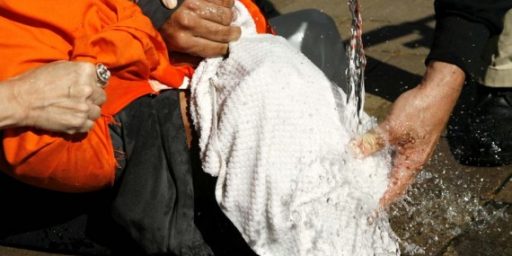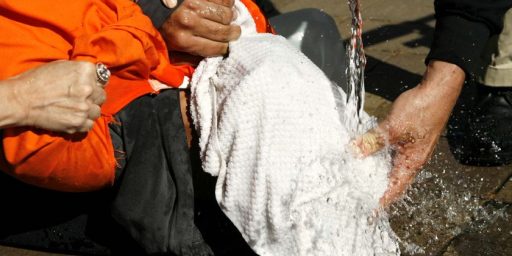Outsourcing Torture
The New Yorker features a disturbing piece entitled, “Outsourcing Torture: The secret history of America’s ‘extraordinary rendition’ program.”
On January 27th, President Bush, in an interview with the Times, assured the world that “torture is never acceptable, nor do we hand over people to countries that do torture.†Maher Arar, a Canadian engineer who was born in Syria, was surprised to learn of Bush’s statement. Two and a half years ago, American officials, suspecting Arar of being a terrorist, apprehended him in New York and sent him back to Syria, where he endured months of brutal interrogation, including torture. When Arar described his experience in a phone interview recently, he invoked an Arabic expression. The pain was so unbearable, he said, that “you forget the milk that you have been fed from the breast of your mother.â€
Arar, a thirty-four-year-old graduate of McGill University whose family emigrated to Canada when he was a teen-ager, was arrested on September 26, 2002, at John F. Kennedy Airport. He was changing planes; he had been on vacation with his family in Tunisia, and was returning to Canada. Arar was detained because his name had been placed on the United States Watch List of terrorist suspects. He was held for the next thirteen days, as American officials questioned him about possible links to another suspected terrorist. Arar said that he barely knew the suspect, although he had worked with the man̢۪s brother. Arar, who was not formally charged, was placed in handcuffs and leg irons by plainclothes officials and transferred to an executive jet. The plane flew to Washington, continued to Portland, Maine, stopped in Rome, Italy, then landed in Amman, Jordan.
[…]
A year later, in October, 2003, Arar was released without charges, after the Canadian government took up his cause. Imad Moustapha, the Syrian Ambassador in Washington, announced that his country had found no links between Arar and terrorism. Arar, it turned out, had been sent to Syria on orders from the U.S. government, under a secretive program known as “extraordinary rendition.†This program had been devised as a means of extraditing terrorism suspects from one foreign state to another for interrogation and prosecution. Critics contend that the unstated purpose of such renditions is to subject the suspects to aggressive methods of persuasion that are illegal in America—including torture.
[…]
Rendition was originally carried out on a limited basis, but after September 11th, when President Bush declared a global war on terrorism, the program expanded beyond recognition—becoming, according to a former C.I.A. official, “an abomination.†What began as a program aimed at a small, discrete set of suspects—people against whom there were outstanding foreign arrest warrants—came to include a wide and ill-defined population that the Administration terms “illegal enemy combatants.†Many of them have never been publicly charged with any crime. Scott Horton, an expert on international law who helped prepare a report on renditions issued by N.Y.U. Law School and the New York City Bar Association, estimates that a hundred and fifty people have been rendered since 2001. Representative Ed Markey, a Democrat from Massachusetts and a member of the Select Committee on Homeland Security, said that a more precise number was impossible to obtain. “I’ve asked people at the C.I.A. for numbers,†he said. “They refuse to answer. All they will say is that they’re in compliance with the law.â€
While I’m not of the position that aggressive interrogation techniques are never appropriate when dealing with foreign nationals for whom there is strong evidence of terrorist ties, it clearly appears that more safeguards need to be put in place to limit their use. As the piece makes clear, “extraordinary rendition†has been a tool of our intelligence community since well before the current administration took office. Not unreasonably, the use of this discretionary authority escalated after 9/11.
To the extent that Guantanimo-style short-of-torture interrogation techniques are part of the public policy of the United States, they should be conducted by American personnel under the aegis of American law. If we’re too squeamish to do it ourselves, on the grounds that it violates our moral code, that should tell us something. If, on the other hand, we’re doing it to skirt the technical requirements of American law, we should change to law to either 1) allow these techniques under prescribed circumstances or 2) preclude outsourcing.
The most problematic issue to me, even more so than sending suspected terrorists to countries where we know they may be tortured, is the lack of oversight procedures. While keeping covert operations secret is vital to the nation’s security, this secrecy should not extend to members of congressional committees charged with oversight responsibility. The CIA simply can not be permitted to refuse to answer questions from Congress.
via Phil Carter






James, your excuse making for this administration is shameless. Extraodiary rendition, as the article explains, was used by prior administration only when there were foreign government arrest warrrents already outstanding. Bush is using it for anyone he deems an ‘illegal enemy combatant’ without any judicial oversight.
And your further excusing Sen McCains treatment at the hands of his North Vietnamese captures as short-of-torture is just plain frightening. Just because his treatment fell within your presidents definition of legitimate interrogation techniques does not mean, in the civilized world anyway, that it was not torture.
Your standard, that if your guy does it then it is ok, when applied universally can excuse the worst tyrants in the world from ever coming to justice.
“I’m outraged by the outrage”…as the excellent senator Inhofe from Oklahoma likes to say.
This is America, we are are not going to be interrogating anyone who isn’t very likely to be a terrorist. These people are lucky to be alive really after what their friends did on sept 11, (whether they are close acquiaintances or not).
This is America, we are are not going to be interrogating anyone who isn’t very likely to be a terrorist.
Yes, the legendary infallibility of our law enforcement and intelligence bureaucracies assures that.
These people are lucky to be alive really after what their friends did on sept 11, (whether they are close acquiaintances or not).
Hm. Maybe “this” isn’t “America” after all.
I understand our torture is so very bad that several Brits have volunteered to endure American-style torture for a new UK reality show.
One of the mantras of the left-Dem opposition to Bush in 2004 was “a vote for Bush is a vote for torture.” Perhaps some of you recall mocking that slogan?
Now Prof. Woo, torture-memo author, comes out & says this:
Yoo also argued that the Constitution granted the President plenary powers to override the U.N. Convention Against Torture when he is acting in the nation¡’s defense–a position that has drawn dissent from many scholars. As Yoo saw it, Congress doesn’t have the power to “tie the President’s hands in regard to torture as an interrogation technique.†He continued, “It’s the core of the Commander-in-Chief function. They can’t prevent the President from ordering torture.†If the President were to abuse his powers as Commander-in-Chief, Yoo said, the constitutional remedy was impeachment. He went on to suggest that President Bush’s victory in the 2004 election, along with the relatively mild challenge to Gonzales mounted by the Democrats in Congress, was “proof that the debate is over.†He said, “The issue is dying out. The public has had its referendum.â€Â
Well, Prof. Woo certainly thinks a vote for Bush was a vote for torture. Anyone doubt that the CIA and DOJ are going to see things his way?
The emotional torture I go through from leftist crap is beyond belief. Where is that complaint form?
Whereas I might have trouble working up sympathy for out-of-uniform foreign nationals who have been found armed or “with gunpowder on their hands” in a combat area, it is objectionable that an unarmed individual “captured” at an American airport should be channeled into anything like “extraordinary rendition.”
As described, “extraordinary rendition” is disgusting. As described, war is hell. It’s a safe bet that in hell some disgusting things are necessary. “Disgusting” is one thing, “objectionable” is another. If this report is reasonably accurate, then I agree that someone has crossed the tripwire between the two.
Maggie, show me the UK game show where the contestants are forcibly sodomized? Possibly tortured to death? Either you really need to read more and not react out of ignorance and manipulation, or you have a very different idea of a good time than I do.
“These people are lucky to be alive…”
Implying that we are being charitable and would have been within our rights to line em up and shoot em. As was done to Native Americans in the past. Oh, but that was war, too. OK then.
Lets not forget the crucial Canadian role in all of this. The reason that the US acted on Maher Arar is that Canada’s CSIS (domestic intel service like British MI-5) were surveiling Arar for quite some time. They had serious concerns about him. There were not able to arrest him or detain him. CSIS made the recommendation that the US deport Arar. CSIS still believed that Arar was a terrorist and made recommendations to the Canadian government not to intervene even after he ended up in Syria. Why they had such a strong opinion and why the Canadian Foreign Affairs department decided to finally intervene will eventually come out (or not).
The case was not as simple as USA doing something capricious. They were doing thier Canadian counterparts a favor. You may of course not agree with it but then none of us has the intel data to know what lead to the decisions taken.